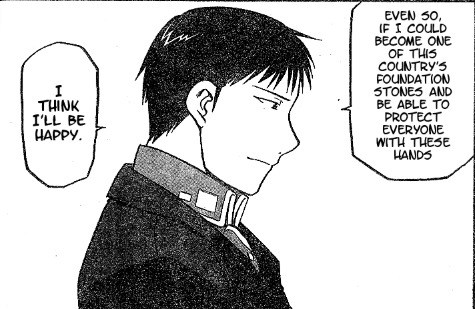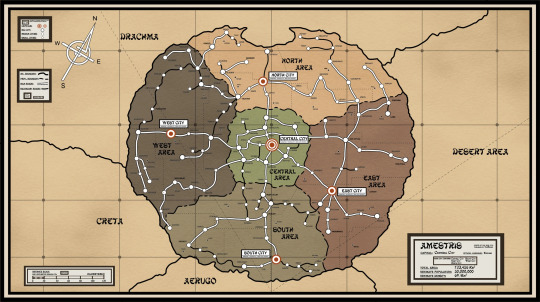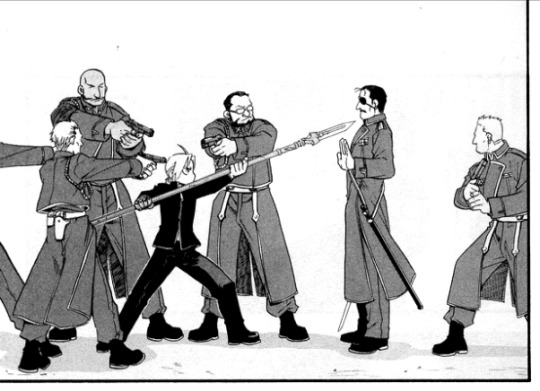Analyses of both the 2003 anime Fullmetal Alchemist and the 2009 anime Fullmetal Alchemist: Brotherhood !SPOILERS!
Don't wanna be here? Send us removal request.
Text
Transmutation: The Formation of Amestris
Despite the silly animation moments and child protagonists, both versions of Fullmetal Alchemist have dark backstories. Fullmetal Alchemist and its more recent adaptation Fullmetal Alchemist: Brotherhood is an anime that show two main protagonists, Ed (Edward) and Al (Alfonse) Elric. At first, we see Ed lose his arm and leg and Al loses his body to alchemy when trying to bring their mother back from the dead. The two boys spend countless episodes trying to search for the Philosopher’s Stone, an element from which they can restore the parts of their body they have lost to alchemy and possibly bring their mother back from the dead. Transmutation, the act of changing from one form to another, in Fullmetal Alchemist: Brotherhood is presented as a way of life and has a deeper cultural meaning than on the surface. There are strong themes of imperialism and colonialism in Fullmetal Alchemist, both in the 2003 anime as well as the 2009 anime, Fullmetal Alchemist: Brotherhood. We have events such as the civil war in Ishval, and we see there is Fuhrer Bradley. This strong military rule is a clear presentation of imperialism. Arguably, this could be seen as a transmutation from different cultures and groups of people into one overall nation, Amestris.

A majority of Amestris was formed through the country that existed previously without a structured government. The philosophies of alchemy are what brought the country into power. Once the nation gained influence, they began expanding by invading the surrounding countries and capturing the natives in order to convert them. This is how Amestris came to be and is the main point of the transmutation argument I have created. In this argument, the natives have to give everything to live. This is similar to colonialism in real life, where the English colonized America and took over the Native Americans. This formation of America cost the Natives their culture and their freedom. White Americans discriminated against indigenous peoples and kept other people of color as slaves for their own personal gain. This can be tied to the theme of transmutation, where the Native Americans were decultutrized and changed from one culture and one group of people into "true Americans." They lost their culture, their accents, and themselves altogether. This is also seen in Fullmetal Alchemist (2003) and Fullmetal Alchemist: Brotherhood in the formation of Amestris, which will be discussed more.

Transmutation, previously described as the act of changing from one form to another, is a large part of the Fullmetal Alchemist anime, and it starts with transmutation circles. Circles are used in alchemy to represent an uninterrupted flow of energy and show that all parts of alchemy are equal, showing the law of equivalent exchange. Only alchemists can use transmutation circles, and they cannot be damaged otherwise they won’t work. Different shapes and texts are present in the transmutation circles to create specific processes, including squares, triangles, rectangles, and German or Latin texts. It is shown frequently in Fullmetal Alchemist: Brotherhood that the state alchemists and military use transmutation circles for good, but we are never shown the “secrets” of the imperialistic military where they may use transmutation circles for evil. According to Louis Kemner, on the topic of transmutation circles, “the largest being the nation-wide circle that Father used on the promised day,” (Kemner). Father had an entire transmutation circle hidden under the streets of Amestris with the goal of spreading the Philosopher’s Stone so he could absorb the souls of all Amestrians in order to become an almighty being. His plan was to sacrifice five humans and absorb the souls of all Amestrians while gaining power, which fortunately ends up failing. It is also never explicitly stated that transmutation circles are the only methods for changing something. There are also theoretical implications of transmutation where there is the transmutation of a mixture of people into one unified nation. It is interesting when you think about this transmutation with the idea of the law of equivalent exchange. What had to be taken from those people for Amestris to become a nation? Why is there a Fürher and not a democratic rule of the nation?

Führer King Bradley was one of the primary antagonists in Fullmetal Alchemist, as it is revealed that he was a homunculus created by Father to rule on his behalf. Father is the absolute antagonist, but Bradley is seen much more frequently and we believe he is the true antagonist before his secret that he is a homunculus is revealed. His son, Selim, was also a homunculus created to fight for Father. With this power and the fact that he was the sin of wrath in Fullmetal Alchemist: Brotherhood and pride in Fullmetal Alchemist (2003), Fuhrer King Bradley was heartless and saw humans as weaklings who were not fit to live in the same world as him. While he did keep his wrath and disgust under wraps most of the time, it is still seen that he is just as driven towards Father’s cause as the rest of the homunculi throughout the anime. Nothing seems to be off about Bradley, but he is hiding one of many secrets for Father that could be detrimental to Amestris.

Edward and Alfonse, the two main protagonists of Fullmetal Alchemist: Brotherhood, are called upon by Fürher King Bradley and Colonel Roy Mustang to hunt for Isaac the Freezer, an alchemist whose goal is to bring down imperialist Führer King Bradley in the very first episode of Fullmetal Alchemist: Brotherhood. Isaac the Freezer, or Isaac McDougal, freezes or boils his enemies using water alchemy. While the motive is not explicitly stated in the episode, it is believed that McDougal, who is a rouge state alchemist, was trying to bring down the Fürher and end his imperialistic reign over Amestris. The main plot of this episode was Edward and Alfonse attempting to hunt down McDougal, which in the end he does get sliced by Bradley, the Fürher himself. Bradley slices McDougal with inhuman speed and accuracy after McDougal freezes Central command by activating numerous transmutation circles in the surrounding area. An idea from this episode is that perhaps McDougal knew something about the state alchemists and the military that the general public didn’t know. Perhaps, how the people who were colonized during the imperialistic reign of the Fürher felt when they were forced to change how they were to live in Amestris as it was being formed. Or maybe he just had rage towards the state military. It is said by viewers that his intention was to bring the military down and reveal their secrets, however, we do not know exactly what these secrets are.

2 notes
·
View notes
Text
Works Cited
A compilation of the works I have utilized thus far in my work.
Caldwell, Megan. “The Effects of Colonization: How It Happened and How It Still Continues.” Medium, Medium, 19 Feb. 2017, https://medium.com/@megancaldwell62/the-effects-of-colonization-how-it-happened-and-how-it-still-continues-b463350d1ac5.
“Amestris.” Fullmetal Alchemist Wiki, https://fma.fandom.com/wiki/Amestris.
Fanning, Philip Ashley. Isaac Newton and the Transmutation of Alchemy: An Alternate View of the Scientific Revolution. North Atlantic, 2009.
Kemner, Louis. “Fullmetal Alchemist: Father's Grand Plan, Explained.” CBR, 22 June 2020, https://www.cbr.com/fullmetal-alchemist-father-grand-plan-explained/.
Wright, Chy. “The Value of Amestris: Imperialism in Fullmetal Alchemist.” Medium, Medium, 20 Mar. 2019, https://medium.com/@chywright/the-value-of-amestris-imperialism-in-fullmetal-alchemist-5bf2d1921858.
“Fullmetal Alchemist.” Fullmetal Alchemist: Brotherhood written by Hiroshi Ōnogi, directed by Takahiro Ikezoe, Aniplex, April 5, 2009.
0 notes